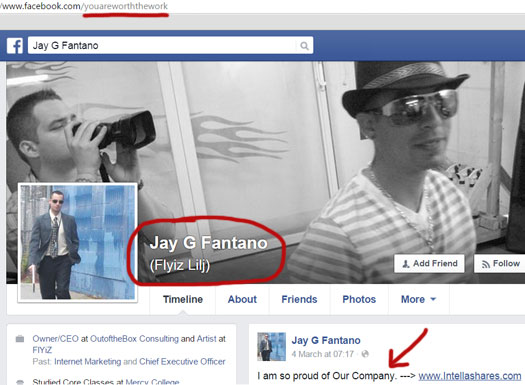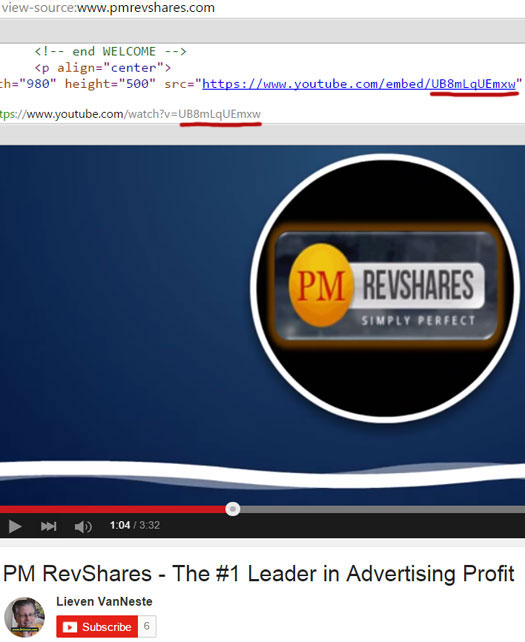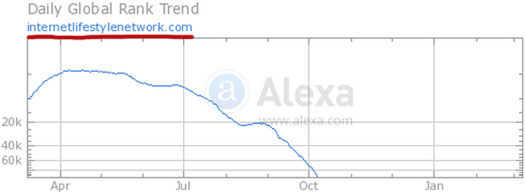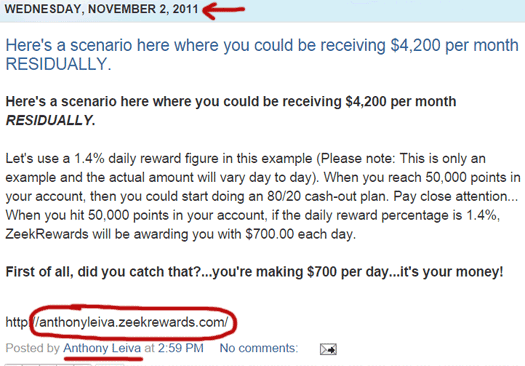IntellaShares Review: $2.50 advertising-based micro Ponzi
 There is no information on the IntellaShares website indicating who owns or runs the business.
There is no information on the IntellaShares website indicating who owns or runs the business.
The IntellaShares website domain (“intellashares.com”) was registered on the 14th of January 2014, with a “Jay Fantano” listed as the domain owner. An address in the US state of New York is also provided.
Further research reveals the address provided to be that of a residential building.
On his Facebook profile, Fantano refers to IntellaShares as “our company”:

The use of “our” is explained through Fantano’s referring of his fellow IntellaShares admins as “the 4 horsemen”.
In an email sent out to IntellaShares affiliates in January, Fantano identifies the three other individuals running the company as Dave Reit, Joe Beach and Samantha Cruz.
The 4 Horsemen is a name that the Owners have adopted as sort of a battle cry against scams and quick to die programs. It is our way to promote the message that we are different.
We are competent, convicted, and committed.
We have seen enough failures in the last 90 days and we want to do something about it.
We are not a group of scammers. I, personally am a Golf Professional. I teach privately and compete locally.
Joe and Dave are musicians and fathers. Samantha is a professional young woman, background in sales, customer service, and restaurant management.
Somewhat curiously, Fantano refers to himself as “John Fantano” instead of Jay – as it appears on the IntellaShares domain registration and his Facebook profile.
Fantano’s Facebook profile meanwhile reveals he has been involved in
- AdsClickPay – $5 investments on the promise of a $6.50 ROI, launched December 2014 and collapsed in January 2015
- AdReverts – Ponzi investment scheme launched in December 2014, affiliates invested $5-$30 on the promise of up to $30,000 ROIs
- HeavenPaid – 130% ROI Ponzi investment scheme
- ClickAdPays – Ponzi investment scheme that solicited $1-$100 investments
- IQLife – recruitment-driven social network scheme
Prior to his involvement in the MLM industry, Fantano was delivering pizzas (2013). MLM promotion began on Fantano’s Facebook profile in early 2014.
After jumping from opportunity to opportunity over the past two years, evidently Fantano and friends have now decided to launch their own company.
Read on for a full review of the IntellaShares MLM business opportunity. [Continue reading…]
PM RevShares Review: Hourly RevShare Ponzi rebooted?
 There is no information on the PM RevShares website indicating who owns or runs the business.
There is no information on the PM RevShares website indicating who owns or runs the business.
The PM RevShares website does have an “about us” page, however clicking the link to it returns a “404 Page Not Found” error message.
The PM RevShares website domain (“pmrevshares.com”) was registered on the 21st of November 2014, however the domain registration is set to private.
A YouTube video that features on the PM RevShares website was uploaded to a YouTube account named “Lieven VanNeste”:

VanNeste also features on PM RevShares testimonials page, where he gives a glowing appraisal of PM RevShares’ admin:
PMrevshares is based on real Forex Trading and on real Advertising Revenue
This program is run by an Admin that I know to be Trustworthy & Efficient
GRAB A SPOT quickly – cause, you know how it goes, if you can be in as ONE OF THE FIRST
This Program is structured to be able to LAST FOR YEARS
Further research reveals that a few years back VanNeste was heavily involved in Hourly RevShare.
Hourly RevShare launched in November of 2012 and was run by Anelie Steinway. The scheme saw affiliates invest $5 on the expectation of an advertised ROI of up to 195%.
By March of 2013, Hourly RevShare began having payment processor problems. The scheme began delaying payments to investors, with it finally collapsing sometime around May or June of 2013.
Some investors were purportedly refunded, but by and large the majority of investors in Hourly RevShare were abandoned and lost their money.
Investors discussing the collapse suggest that VanNeste himself was behind the scheme, with Steinway serving only as a puppet.
After Hourly RevShare VanNeste then went on to join MyFunLife, a $21 a pop travel-based recruitment scheme. Hourly RevShare affiliates also claim VanNeste joined TelexFree, a $1.8 billion Ponzi shut down by the SEC in 2014.
The inclusion of a YouTube video on the PM RevShares website suggests that at the very least, VanNeste is close to whoever is running the scheme.
At worst VanNeste himself is running PM RevShares, which means the testimonial he wrote praising the admin “he knows” is highly misleading.
Either way it would appear the same people or person(s) who were behind Hourly RevShare are trying their luck again with PM RevShares.
As always, if a MLM company is not openly upfront about who is running or owns it, think long and hard about joining and/or handing over any money. [Continue reading…]
Herbalife issue the pyramid scheme or stock manipulation?
 Standard practice here at BehindMLM is to ignore stock market theatrics.
Standard practice here at BehindMLM is to ignore stock market theatrics.
Herbalife’s stock price goes up, it goes down, some guys appear on tv to talk about it and so it goes.
Of far more importance is the regulatory side of the Herbalife story, which just got more interesting with news of an FBI probe breaking yesterday.
Whereas in the past though we’ve seen the FTC and SEC both investigate and continue to investigate Herbalife directly, the FBI’s investigation is a little different.
…or is it? [Continue reading…]
RewShare Review: $10 “ad pack” Ponzi investment scheme
 There is no information on the RewShare website indicating who owns or runs the business.
There is no information on the RewShare website indicating who owns or runs the business.
The Rewshare domain was registered on the 5th of January 2015, however the domain registration is set to private.
Although the RewShare admin doesn’t disclose their identity, they are interacting with potential affiliates on social media.
In various messages over the last few weeks, the RewShare admin writes
This is my first site of this kind. And i`m planning to keep the site online for as long as posible (sic). Actualy (sic) i don`t want to close it and i have no intention in doing that.
i started with shared hosting just to save some money. And i did good, because i chosed (sic) a noobie designer and also a student one. So he worked at the site only in his free time.
it is really against Paypal rules the 3 level referral sistem? (sic) To be honest, i didn`t know that.
Anyway, i`m not planning to keep PayPal. Just for the start. After that i will pull it out.
As always, if a MLM company is not openly upfront about who is running or owns it, think long and hard about joining and/or handing over any money. [Continue reading…]
Togetherness Review: Benefie points investment scheme
 Togetherness went into prelaunch in early 2014 and provide a corporate address in Seychelles on their website.
Togetherness went into prelaunch in early 2014 and provide a corporate address in Seychelles on their website.
Further research reveals this address to belong to Abacus Seychelles, an offshore business registration provider.
Abacus Seychelles don’t provide the cost of registering a company name through them on their website, but do state that incorporation takes only “1-2 business days”.
As such, Togetherness would appear to exist in Seychelles in name only, with where the company is actually being run out of not provided on the company’s website.
 Credited as CEO of Togetherness is Nicklas Liberg (right).
Credited as CEO of Togetherness is Nicklas Liberg (right).
Other than disclosing Liberg’s name, the Togetherness website fails to provide any further information. Instead, the company’s “about us” page is used to provide a marketing spiel about the company.
Liberg appears to be based out of Sweden, which is likely where Togetherness is actually being run out of (and probably explains the clunky name).
Back in 2005 a Nicklas Liberg in Gothenburg, Sweden, lamented his loss of $11,600 USD in a local pyramid scheme.
The scheme appears to have revolved around DVD rentals, scamming 180 Swedes out of $582,000 USD.
Affiliates pumped thousands of Krona into the scheme each month, on the promise of advertising ROIs.
Likely due to language-barriers, I was unable to piece together anything further (at least not concrete) on Liberg’s MLM past.
I will mention though that he seems to have been involved in something called “FX Club” back in 2006. There’s a few social media discussions among people who seem to think that was a pyramid scheme too.
Nothing more recent than that unfortunately.
Read on for a full review of the Togetherness MLM business opportunity. [Continue reading…]
AdRevenuePro Review: $5-$10,000 ad-based Ponzi scheme
 There is no information on the AdRevenuePro website indicating who owns or runs the business.
There is no information on the AdRevenuePro website indicating who owns or runs the business.
The AdRevenuePro website domain (“adrevenuepro.com”) was registered on the 27th of January 2015, however the domain registration is set to private.
There seems to be a lot of AdRevenuePro affiliate promotional material available in Russian, as well as Russian appearing on the AdRevenuePro website itself:

This suggests that those running AdRevenuePro are likely based out of Russia.
As always, if a MLM company is not openly upfront about who is running or owns it, think long and hard about joining and/or handing over any money. [Continue reading…]
vStream TV Review: Legit media streaming for $349?
![]() There is no information on the vStream TV website indicating who owns or runs the business.
There is no information on the vStream TV website indicating who owns or runs the business.
The vStream TV website domain (“vstreamtv.com”) was registered on the 27th of January 2015 and lists a David Bremner as the owner. An address in the US state of Virginia is also provided.
 Based on the Nutronix domain email address used to register the vStream TV domain, David Bremner would appear to be a relative of Bob Bremner (right).
Based on the Nutronix domain email address used to register the vStream TV domain, David Bremner would appear to be a relative of Bob Bremner (right).
Bob Bremner is the Founder of both Nutronix and The Legends Network.
Why this information isn’t provided on the vStreamTV website is a mystery.
Read on for a full review of the vStream TV MLM business opportunity. [Continue reading…]
What happened to Internet Lifestyle Network?
 Mid 2014 saw BehindMLM review the Internet Lifestyle Network.
Mid 2014 saw BehindMLM review the Internet Lifestyle Network.
Co-founded by Mark Hoverson and Vince Ortega Jr., the Internet Lifestyle Network acted as a feeder to build Mark Hoverson’s Global Resorts Network downline.
With no retail offering to speak of, Internet Lifestyle Network pretty much relied on a constant new stream of affiliates to keep commissions rolling.
Late 2014 however saw things sharply decline:

Today, whilst researching something else entirely, I found myself at the Internet Lifestyle website.
As I often do when this happens, I took a few moments to poke around and see where the company was at.
That’s when I realized something was up… [Continue reading…]
Tellus Mall Review: E-commerce & matrix recruitment
 Tellus Mall went into prelaunch in early 2015. No corporate address is provided on the company’s website, however the Tellus Mall website domain was registered with an address in New Brunswick, Canada.
Tellus Mall went into prelaunch in early 2015. No corporate address is provided on the company’s website, however the Tellus Mall website domain was registered with an address in New Brunswick, Canada.
A promo on the Tellus Mall website advises visitors that the company “partners with Spinding and Social Zing”:

Spinding went into prelaunch in early 2014 and initially saw affiliates invest between $30 to $1890 on the expectation of an advertised $10 to $320 daily ROI.
Not surprisingly, the launch of Spinding in March was delayed due to compliance issues.
The scheme did eventually launch, however the matrix cycler queues stalled shortly after launch. This prompted the addition of a matrix to Spinding’s compensation plan.
The app Spinding was supposed to be based on was still MIA as of July 2014.
SocialZing on the other hand launched in mid 2014 and pay affiliates $100 per new recruit.
Both SocialZing and Spinding operated in the marketing MLM niche, with both in one way or another relying on affiliate recruitment to sustain themselves.
Regarding their partnership with Tellus Mall, unfortunately the explicit nature of the partnership is not clarified on the Tellus Mall website.
A “meet the Tellus team” page features on the Tellus Mall website, with Anthony Leiva cited as a co-owner of the company.
No other co-owners are mentioned on the Tellus Mall website, leaving a question mark over the involvement of Paul Nash and Scott Brodkorb (owners of Spinding and CEO of SocialZing respectively).
Anthony Leiva and Julie Curley (owner of the Tellus Mall website and listed as the “Principal” of the company), appear to have been working together for some time.
 Marketing a company he was involved in at the time, in 2008 Leiva (right) wrote
Marketing a company he was involved in at the time, in 2008 Leiva (right) wrote
Hello All,
I am a very Lucky person. My mentor and good friend is Julie Curley.
I have a background in VOIP technologies. Julie showed me this new company she runs as the Director of Operations and Support that I currently work for, Biz Calling Cards.
I am one of the top producers and have a big sales organization.
The pair again teamed up to run something called Ads2TXT in 2010. In September of 2011 Leiva joined Stiforp, a matrix-based opportunity that paid affiliates to recruit.
A few months later in November of 2011, Leiva went on to join and invest in Zeek Rewards.

Zeek Rewards was an $850 million Ponzi scheme shut down by the SEC in 2012. Whether or not Julie Curley joined him in the opportunity is unclear.
Post Zeek Leiva got involved in The Legends Network, which once again paid him to recruit new affiliates.
Read on for a full review of the Tellus Mall MLM business opportunity. [Continue reading…]
NetworkAddsM2M Review: $19.95-$100 three-tier cash gifting
 There is no information on the NetworkAddsM2M website indicating who owns or runs the business.
There is no information on the NetworkAddsM2M website indicating who owns or runs the business.
The NetworkAddsM2M website domain (“networkaddsm2m.com”) was registered on the 6th of January and lists a “Johnny Spears” as the owner.
Why Spears’ name does not appear on the NetworkAddsM2M website is unclear.
 Back in 2011 Spears (right) was an affiliate with Yoli (health and wellness). At some point Spears then left Yoli to join Limitless Worldwide (anti-aging, personal care, fitness and nutrition).
Back in 2011 Spears (right) was an affiliate with Yoli (health and wellness). At some point Spears then left Yoli to join Limitless Worldwide (anti-aging, personal care, fitness and nutrition).
At the time of publication, banner ads linking to Spears’ Limitless Worldwide affiliate webpage were appearing on the NetworkAddsM2M website.
Read on for a full review of the NetworkAddsM2M MLM business opportunity. [Continue reading…]

